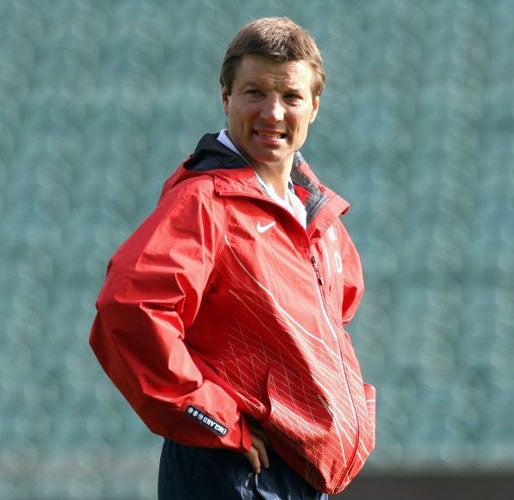Andrew defends autumn failure
Supporters understand the size of the task, claims director of elite rugby

Your support helps us to tell the story
From reproductive rights to climate change to Big Tech, The Independent is on the ground when the story is developing. Whether it's investigating the financials of Elon Musk's pro-Trump PAC or producing our latest documentary, 'The A Word', which shines a light on the American women fighting for reproductive rights, we know how important it is to parse out the facts from the messaging.
At such a critical moment in US history, we need reporters on the ground. Your donation allows us to keep sending journalists to speak to both sides of the story.
The Independent is trusted by Americans across the entire political spectrum. And unlike many other quality news outlets, we choose not to lock Americans out of our reporting and analysis with paywalls. We believe quality journalism should be available to everyone, paid for by those who can afford it.
Your support makes all the difference.Was that the sound of boos and whistles we heard at the conclusion of England's record-breaking defeat by South Africa, the reigning world champions, a week and a half ago? Rob Andrew says not. According to the national union's director of elite rugby, the Twickenham public are not in the least disenchanted by the current state of red-rose affairs, which can be statistically summarised as follows: one try and 26 points scored in three autumn internationals against the SANZAR nations; nine tries and 102 points conceded. Maybe they were booing the bloke in the hot dog stall.
"I'm around the supporters a lot and I find they understand what the team is going through, where we are in the cycle and the size of the rebuilding job Martin Johnson has been handed," Andrew said yesterday. "You can't give players 25 caps' worth of experience in the space of three weeks. It's not possible. And when you look at the amount of experience the Springboks and the All Blacks had on the field during their matches here, you see the amount of work that needs to be done. We lost so many players after the 2007 World Cup. This is why we've given Martin a fixed contract through to the 2011 tournament. We need to put structures in place that will ensure we don't fall into this kind of trough in the future."
Coming from a senior representative of a governing body that has become infamous for its adherence to the "sack first, think later" theory of succession planning, this was just a little rich. (Dave Alred, the kicking coach who received his cards from the Rugby Football Union in 2006, is now back on the payroll, albeit under a part-time arrangement. Really, you couldn't make it up).
Equally flabbergasting was Andrew's assertion that England had suffered a greater player drain than New Zealand. For the record, the All Blacks lost Doug Howlett, Aaron Mauger, Luke McAlister, Byron Kelleher, Anton Oliver, Carl Hayman, Chris Jack and Jerry Collins to the lure of European money the moment they were knocked out of the 2007 competition by France.
Johnson, who accepted the manager's job in profoundly controversial circumstances after a series of not-very-secret discussions with Andrew last spring, also raised the issue of England's shortage of fully-formed international players as he sought to shed light on the embarrassments and humiliations of recent weeks. Yet it was he who decided to ditch the likes of Mark Cueto, Andy Gomarsall, Mark Regan and Ben Kay; to marginalise Josh Lewsey, Mike Tindall, Olly Barkley, George Chuter and Joe Worsley; to restrict Simon Shaw (left), a Test lock since the mid-1990s, to a tour of bench duty. It is reasonable to agree with the vast majority of these decisions, if not all of them. What is not reasonable is to turn away from such know-how and then lament its absence.
Part of the problem from Johnson's perspective is that he has not felt able to say to English supporters the things the France coach Marc Lievremont has said to the Tricolore public across the Channel: namely, that if a side with the potential to win a World Cup on All Black soil in three years' time is to be pieced together, short-term pain is inevitable. The RFU has never been as sympathetic to such ideas as the governing body in Paris.
"I didn't expect us to lose by the margins we did," Johnson admitted yesterday, "and it's been a blow to confidence and morale. The people we picked for these matches were the best available and I don't want to use the gaps in experience between us and our opponents as an excuse. But this has been the toughest series of matches I can remember. There are young guys here now who have faced the best sides in the world, taken their knocks and are saying to themselves: 'Right, where do we need to improve?' We can harp on about why we're in this position, but we are where we are. Will we win the Six Nations after Christmas? I can't say. Will we be competitive? Yes, I think so."
Whatever happens over the next few days, during which Andrew will conduct a review of the autumn humblings, the coaching team will remain intact. "They're doing a fantastic job," Johnson insisted. Review processes in the recent past have produced their fair share of drama: most notably the "day of the long knives" in the spring of 2006, when three front-line coaches – Phil Larder, Joe Lydon and Alred – were given the bum's rush. We can expect no such excitement this time. After the mass sackings of the last three years, not even the RFU has the brass neck to throw more P45s around like ticker tape.
Join our commenting forum
Join thought-provoking conversations, follow other Independent readers and see their replies
Comments